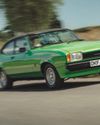
Formula One's banning from 1989 of forced induction in favour of 3.5-litre naturally aspirated engines was expected to reignite the V8 versus V12 (up to 180°) firefight that had raged long before and for some time after - the turbos whistled in at the end of the 1970s. Honda and Renault, however, chose the relatively unexplored V10 route, seeking a better compromise between fuel economy and revs, punch and packaging. They would sweep the board in qualifying - it helped that Ayrton Senna was on board - and win 12 of that season's 16 Grands Prix.
Others followed: prescient independents Ilmor and John Judd's Engineering Developments were picked up by Mercedes-Benz and Yamaha; Peugeot joined in 1994, having twice won at Le Mans using a V10. The trickle became a flood. Though Honda, after 1992 and two seasons with a V12, and Renault (1997) departed the scene but kept their hands in via offshoots Mugen and Mecachrome - the 1998 F1 grid was chocka with V10 blocks, and the fact was made regulatory from 2000. BMW, in 2001, and Toyota, in 2002, having planned a V12, then mixed in.
Ford and Ferrari had stuck to their V8s and V12s - nomenclatures and noises that had forged their brands - until after the post-Ayrton concept for the new regulations. How best to package car and engine: total chassis stiffness, aerodynamics and agility. Before turbos, teams had mainly been private, without the resources of a major manufacturer, so they used a well developed V8 by Cosworth. They were used to it. But we had more freedoms.
"At the first V10 test at Silverstone, Ayrton was unhappy: 'Acceleration too sharp! Deceleration too sharp!' The difference in engine braking compared with a 1.5-litre turbo was huge: the car pitched in corners, balance changed and the driver was uncomfortable. We tried to make the delivery more progressive.
هذه القصة مأخوذة من طبعة April 2023 من Classic & Sports Car.
ابدأ النسخة التجريبية المجانية من Magzter GOLD لمدة 7 أيام للوصول إلى آلاف القصص المتميزة المنسقة وأكثر من 9,000 مجلة وصحيفة.
بالفعل مشترك ? تسجيل الدخول
هذه القصة مأخوذة من طبعة April 2023 من Classic & Sports Car.
ابدأ النسخة التجريبية المجانية من Magzter GOLD لمدة 7 أيام للوصول إلى آلاف القصص المتميزة المنسقة وأكثر من 9,000 مجلة وصحيفة.
بالفعل مشترك? تسجيل الدخول

HIRED MUSCLE
Vauxhall's rebadging of an Australian V8 coupé was an ingenious corporate coup that also inspired its fiery VXR performance sub-brand

'The mighty motor punches this legendary car through the air'
This magnificent Bentley 8 Litre spent much of its life being honed for speed-record success, and its performance is still remarkable today.

MADE TO MAKE YOUR MOUTH WATER
An 'Opal Fruit green' Ford Capri II sparked a Liverpudlian schoolboy's fantasy that would one day become reality

NEW BLOOD TO LIGHT UP HISTORICS
Recent tweaks to the structure of international historic competition are good news for fans of variety

Charge of the light brigade
The Porsche 911 Carrera 3.2 Club Sport's 'less is more' philosophy resulted in a line of revered CS models, led by the 968 and 993

ANGLES OF DESTINY
The wedge-shaped ADO71 could have restored British Leyland's fortunes, but bad timing and an image problem conspired against it

So you want to be a RALLY DRIVER?
If so, the Historic Rally Car Register's Clubmans events are a great place to start. C&SC has partnered with the series for 2025, so let's meet the runners and riders

GRAN DEUR OUT OF A CRISIS
The Mercury Monarch and its Ford Granada twin were products of postFuel Crisis austerity, with compact luxury designed to rival Europe's best

Warts and all
This ex-John Surtees Ferrari 330GT's highly original patina has remained through various owners, and its current custodian plans to keep it that way.

SOME LIKE IT HOT
The United Arab Emirates has been hosting a Middle Eastern take on an Italian classic since 2022, and the event is developing a character all of its own